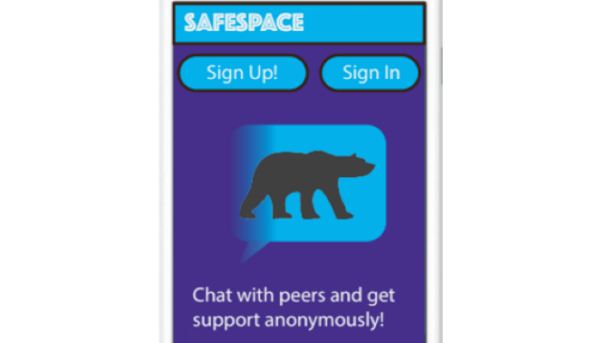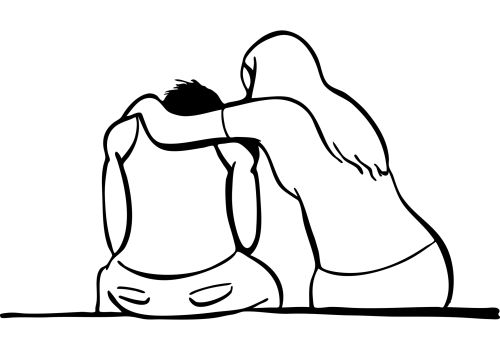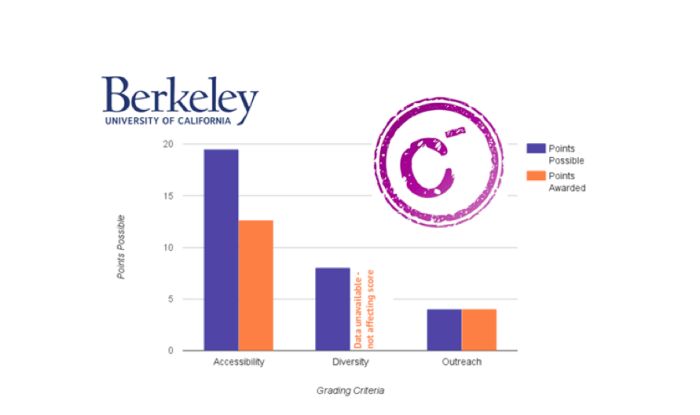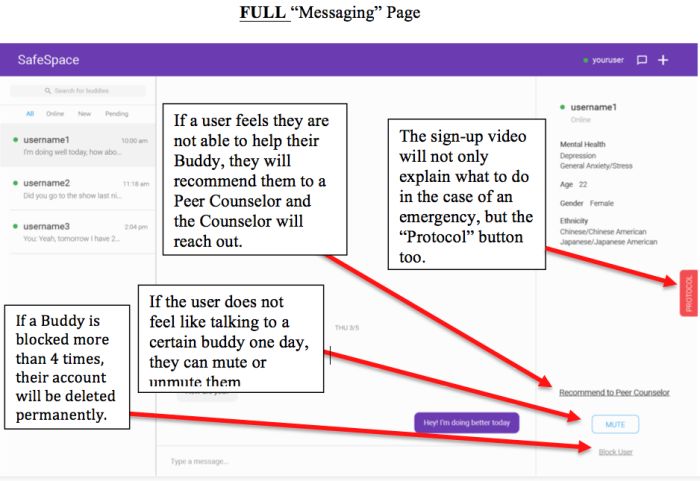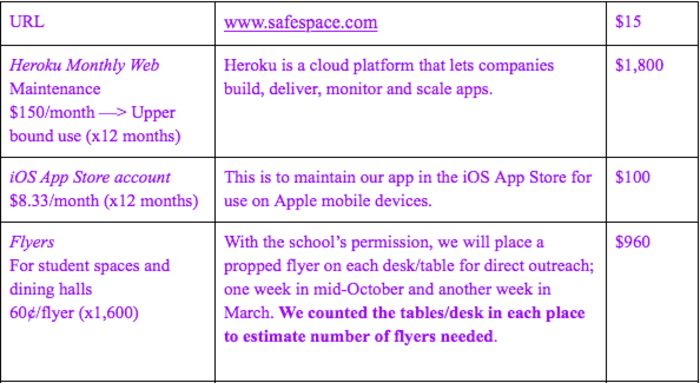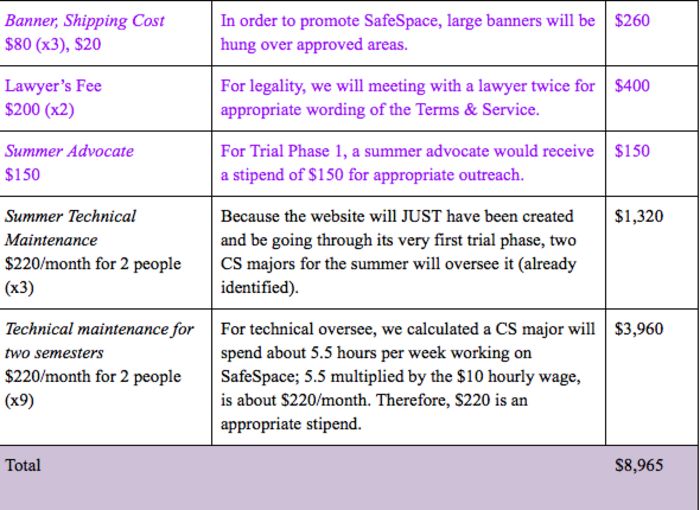SafeSpace
This project has ended, but you can still support amazing Berkeley initiatives by visiting give.berkeley.edu. Your continued support of our students, faculty and staff will ensure that Berkeley remains the #1 public university. Go Bears!
The Problem
Poor mental health is a widespread, national issue plaguing college students across the country.
According to a national survey, 85 percent of University mental health center directors reported an increase in "severe psychological problems over the last 5 years.” Nearly one in six college students have been diagnosed or treated for anxiety within the last 12 months. Nationally, half of all college students report feeling so depressed at some point in time that they “have trouble functioning.” A UC Berkeley report had similar, if not more drastic, results; it reported 8.9% of Cal students have seriously considered suicide.
Ever-increasing college suicide rates have prompted a discussion on mental health; other elite schools like Yale, MIT and other Ivy Leagues are addressing the lack of resources for mental illnesses and stress-related issues. Should UC Berkeley students’ mental health needs only be addressed under dire circumstances? Preventative measures can be taken to address this issue before dire circumstances arise. 75% of lifetime cases of mental health conditions begin by age 24; college is an extremely sensitive time for mental health development. Because prioritization of mental health improves school performance, reduces school withdrawals, and diminishes adverse life-course consequences, its significance should not be neglected.
Part of the problem lies in UC Berkeley’s understaffed and underfunded resources for dealing with mental health issues. Currently, Tang’s CPS services have 50 counselors for 36,000 students (ratio 1:720). Could Tang’s overworked and preoccupied staff be indicative of the desperately needed additional resources? According to an ASUC Senate Bill from 2014’s Mental Health Action Plan, there were only approximately 5,700 students who had records at Tang Center’s CPS services, which is only about 16% of the all 36,000 students; are 30,300 students being neglected? A UC Berkeley Graduate Survey confirms students wish there were more mental health programs on campus. The UC’s are already losing experienced psychologists and psychiatrists –the entire UC system lags behind the private sector in compensation levels for mental health care providers. The rise in severely needed counseling services coupled with a decreasing counseling staff is a problematic paradox.
UC Berkeley's Grade for Mental Health Services on Campus: C-
The Solution:
We are proposing a project idea called SafeSpace: a website AND mobile application for students to anonymously be paired with others similar to themselves and provide each other peer support.
Interested students would create an anonymous username and complete a survey in order to find other peers like themselves. This pairing is done by our filter or ranking function. Students can filter or rank their preferences from categories such as race, religion, sexual orientation etc. So as an Asian with social anxiety, I “filter” out so only Asians come up. If I want to be more specific, then I filter out Asians with social anxiety. If I want to be even more specific, I can filter out Asians with anxiety who are 18 years old (freshman). And so on. The more specific, the smaller your pool gets but the more similar they are to you. Through this function, users can find other Cal Bears with similar backgrounds, thus they would have similar experiences dealing with mental health problems. With similar experiences, peers can support each other better and most importantly to not feel isolated. Therefore, SafeSpace can begin to normalize mental health on this campus.
In addition, we have paired with another student organization, Student-to-Student-Peer-Counseling. This student organization will provide SafeSpace trained peer counselors. They will have general accounts and can have open hours through the days so that students who need more guidance and support will have the option to talk to trained peer counselors.
Furthermore, we will have another tab that lists all the resources both for SHIP and non-SHIP students. We have noticed on campus that people do not know of the myriad of resources at the fingertips of Berkeley students. This resource list can be referred to anytime during the year, so students can find different methods of self-care that would work for them best. These resources would include, but not limited to: different therapy options, clubs on campus, and classes for maintaining wellness.
Will you help us make this program a reality by making a gift today?
Mockups for Website:
Landing Page
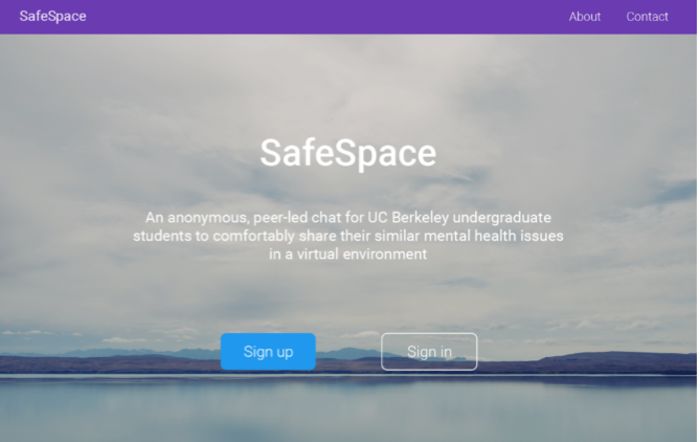
Mockups for Mobile Application:
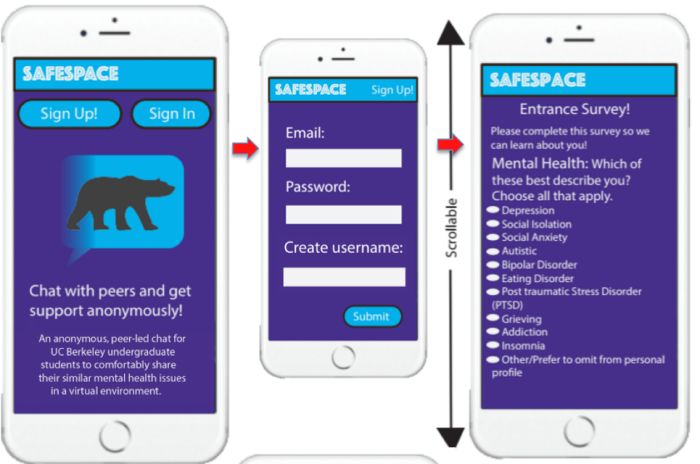
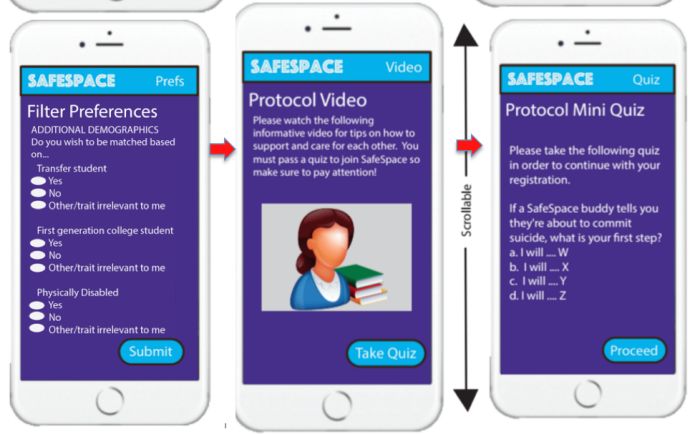
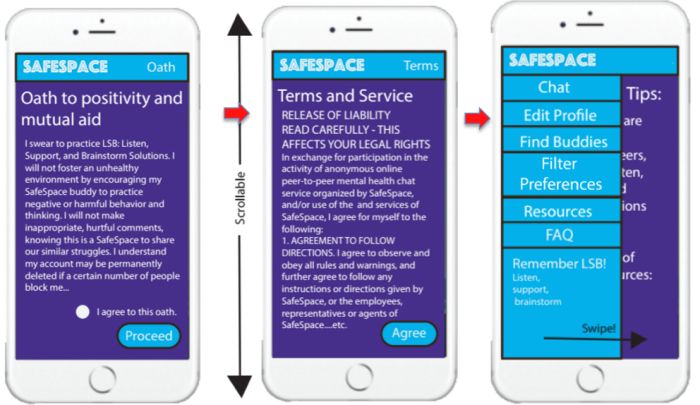
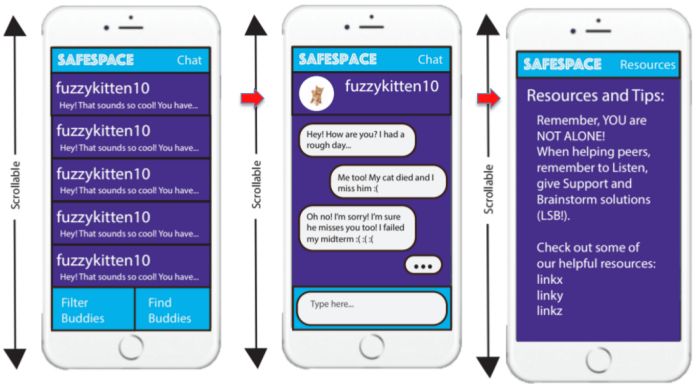
What distinguishes SafeSpace?
1) The fact that SafeSpace removes the danger of stigma is of utmost importance. Students will no longer neglect themselves emotional support because of embarrassment, unwillingness to reach out, or fear of judgment. By removing the very blocks that self-denies students from support, SafeSpace enables and empowers students to have real conversations with each other.
2) SafeSpace is the perfect way to ease students into professional care (if needed) by demonstrating users the positive effects of sharing and talking about their issues. The first step to seeking out professional care is the most difficult; therefore, SafeSpace can serve as that “transitional tool.” For those who do not need serious care, SafeSpace will deter students from becoming isolated and feeling alone. By joining all the lonely people together, the loneliness disappears.
3) No other program or counselor has ever attempted to bring similar UC-Berkeley students together in an anonymous, safe place. Most important, the “filtering” system will allow students to seek and receive exactly the type of person they are looking for (and being looked for) whilst keeping their identities protected.
4) By speaking with others, students will be able to share information on their experiences regarding professional help and make recommendations based on those encounters instead of relying on the Internet or other clinicians with their own set of adult views; not only will students share information about clinics, psychologists, and resources, but also exchange information on overcoming the school’s general bureaucratic and academic obstacles. In other words, SafeSpace will foster a loving community for students to exchange helpful information and advice with one another.
5) SafeSpace will be accessible every day of the week, at every hour. If a student is having a midnight crisis, they can find other late owls who are online (the “online” button will show who is online).
6)The Resource List will be a useful source of information outlining all the different options students can explore. The list itself can be used without ever having to engage in SafeSpace and will spread campus awareness on certain organizations and clinics.
7) SafeSpace can permit students to seek out emotional support at no cost –studies show many Americans cannot afford the cost of their mental health treatment, even if they have insurance.
Our Progress So Far:
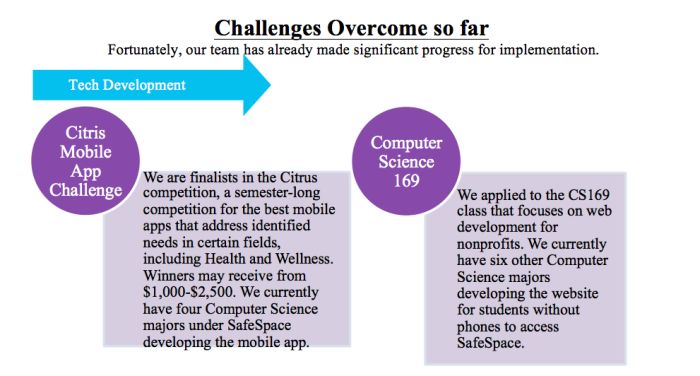
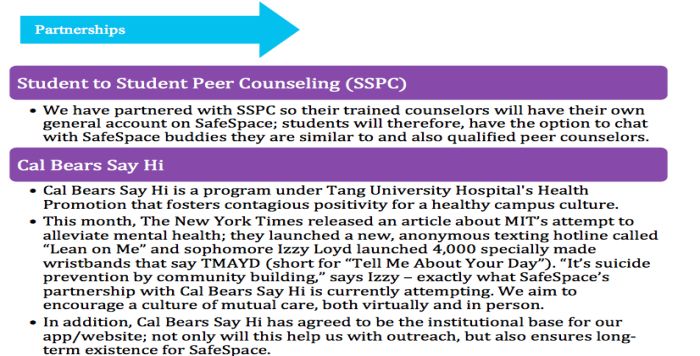

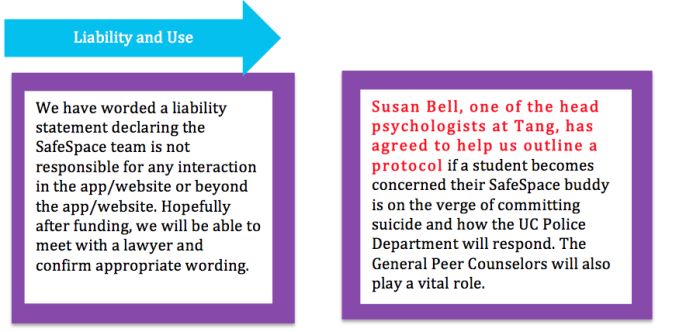
Our Budget:
Anything in purple is what the $4,000 will go towards. However, we do have other expenses to pay, we have looked into other options for funding (i.e grants, competitions, student government) but if we receive more money from crowdfunding it can pay for other items on our budget. Please consider making a gift today!
Our Advertising Plan:
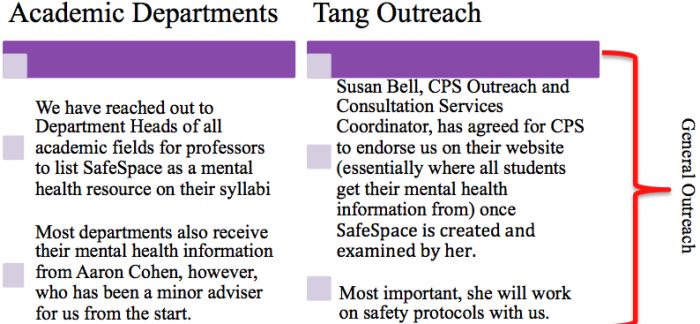

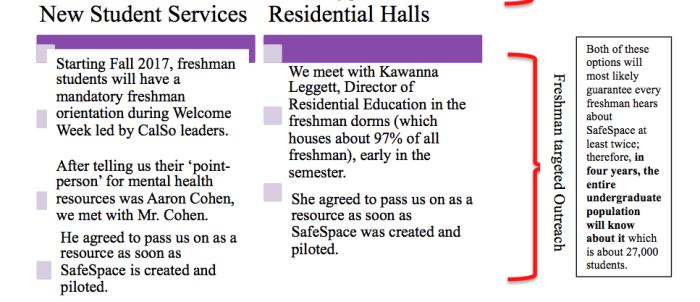
If you have any questions about our project, please contact: Ann Nguyen at nguyenann1026@berkeley.edu
Top image credit: http://www.narbha.org/includes/media/images/youth-mental-health-first-aid-promotion---black-on-white.jpg
$10
Digital Shout Out
A shout out from both our Twitter and Facebook page explaining how awesome you are for donating.
$25
Newsletter
Receive the latest news and updates on our progress from our newsletter allowing you to follow along with us.
$50
Handwritten Thank You Card
Receive a personalized, handwritten Thank You Card signed by the SafeSpace team.
$100
Meet with the team
A video chat or in person meet up with members of the team.
$200
Special Thanks
Have your name written under our "special thanks to" section on our mobile app/website along with other esteemed members who have donated over $200 and/or have dedicated a large portion of their time helping us develop our idea.
$500
Beta Testing
If you have an active Berkeley email you will be able to have exclusive access to our prototype. If you do not have an active Berkeley email a team member will walk you through the website/mobile application. In both instances, you will be one of the first people who will see our product. In addition, you will have the opportunity to give suggestions.
$1,000
Special Reception with Founder
You will receive everything mentioned below and be able to speak to the founder of SafeSpace during a special reception. During the reception, they will be able to tell you how it all got started and the journey to get where we are now.

